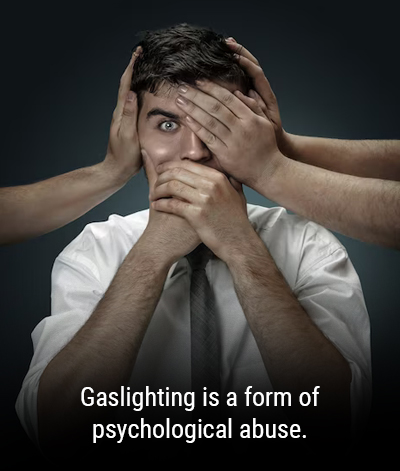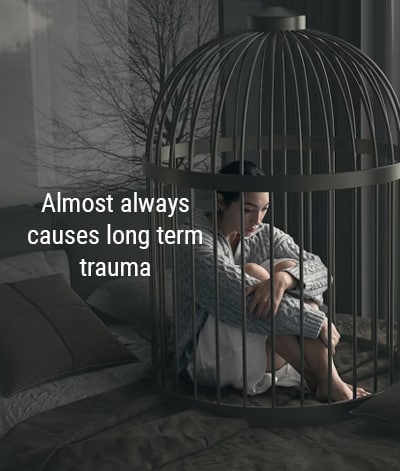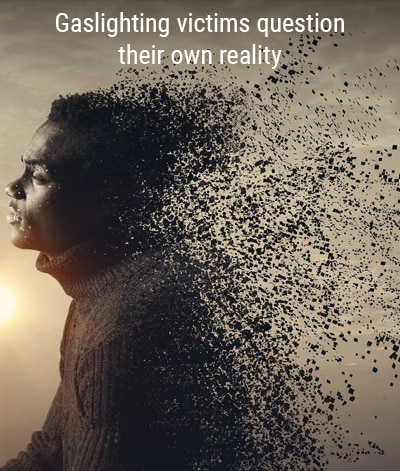By now most of us are familiar with the term “gaslighting” but how many of us really know what it means? We guess that relatively few of us do.
This is why people misuse the term gaslighting so often: they don’t technically understand how to properly define it and recognize when it’s taking place. So let’s change that.
In this article, we’re going to:
- Discuss how the term is misused, misunderstood, and mislabeled
- Uncover the truth about how this ‘misuse of the term’ actually makes it more difficult to help abuse victims
- And describe how destructive and traumatic real gaslighting is—and thus, why it’s so crucial to make sure that we’re using the term in the proper manner whenever we use it
Let’s talk about it.
Overuse and Misuse of the Term ‘Gaslighting’ Happens Every Day
It seems that:
- When someone disagrees with another’s version of a story (which can happen and isn’t even all that uncommon), that person is accused of gaslighting.
- Or if someone doesn’t remember another person saying something they said, they are accused of gaslighting.
- Or even if one doesn’t agree with what another is proposing, they are accused of gaslighting.
In all of these scenarios, the term ‘gaslighting’ is actually being misused.
The fact is that when well-meaning family, partners, colleagues or friends don’t know how to resolve conflict well or can’t quite remember the sequence of events that led to the disagreement that is taking place they are not gaslighting and likely aren’t abusers who gaslight.
This improper use of this serious term of abuse confuses victims of destructive gaslighting and misdirects those responding to a real victim’s plea for help.
The Truth About How Misunderstanding Gaslighting Can Hurt Victims
This overuse—and usually, the misuse—of the term gaslighting causes desensitization to this very harmful and destructive type of emotional abuse. Gaslighting is a subtle, complex and hidden form of psychological manipulation known as covert emotional abuse which holds significant traumatic consequences for its victims.
Not all gaslighting is abusive. Due to the overuse of the term, when a victim of abusive gaslighting shares their experience with another person, it becomes more likely that the one hearing the word may simply roll their eyes and ignore the person making the claim rather than take it seriously and possibly intervene the abusive cycle.
When this happens it is at expense of victims who are experiencing the real thing and serves as a secondary form of trauma for the victim.
Real Gaslighting Is Incredibly Destructive
The reality is that the person who has regularly been gaslit within their relationship by their partner experiences significant harm.
Gaslighting is a form of psychological abuse where a person, group of people, or an organization repeatedly targets an individual to make them question their sanity, perception of reality, or memories.
Abusive gaslighting in relationships happens over time and repeatedly in a pattern within a relationship. The gaslighter’s purpose is to diminish the victim’s sense of self and confidence in their own perceptions, memory and sanity so they will become more dependent upon the gaslighter and eventually adopt the abuser’s reality over their own. They use lying, blame-sifting, partial lies, minimization and other crazy-making tactics to accomplish their goal.

Gaslighting can have profound effects on a person’s mental and emotional well-being. Those subjected to gaslighting often experience:
- Loss of Self-Identity: Gaslighting can distort one’s self-image and self-confidence, leading to a loss of identity.
- Constant Self-Doubt: Victims often second-guess themselves and question their own judgments and memory.
- Feelings of Invalidation: The gaslighter often dismisses the victim’s feelings, making them feel invalidated and unheard.
- Isolation: The victims may feel disconnected from others and struggle with establishing trusting relationships.
- Increased Anxiety and Depression: Chronic gaslighting can lead to mental health issues like anxiety and depression.
A victim who is subjected to ongoing gaslighting over time experiences significant traumatic effects causing Post Traumatic Stress Disorder (“PTSD”) or which can develop into Complex-PTSD.
To learn more about the terrible nature of this destructive form of abuse, read our full guide on the topic.
How It Affects the Victim
The person who is the target of gaslighting often feels confused or anxious, and stops trusting their own perceptions.
Through gaslighting, the abuser (who is often a narcissist, but not always) systematically replaces the victim’s reality with a false reality—eventually shutting the victim down.
Over time and after the abuser continually challenges (or counters) the victim, the victim begins to question their own reality and perspective and whether they are worthy of having their needs and desires met.
Eventually, the victim is so worn down that they unknowingly adopt the abuser’s reality over their own, and they have to learn specific responses to gaslighting tactics in order to recover.

It Almost Always Causes Long Term Trauma
In whatever form it occurs, gaslighting is thought of as one of the more toxic forms of emotional abuse.
A victim who is gaslighted over an extended period of time will lose their perception of reality, question their sanity, doubt their memories, and will find themselves in a constant state of stressful confusion and self doubt.
Eventually, they will become very insecure, emotionally unstable, and depressed not only at home but also at work, school, or in other roles they assume.
The tactic of gaslighting, if not stopped, will effectively make the victim feel blameworthy, powerless, and crazy—as well as force them into isolation and depression.
Misunderstanding Can Cause Greater Harm When Responding to Victims of Abuse
One of the most destructive outcomes of the overuse of the term “gaslighting”occurs when those who are responding to real victims misunderstand the term. In their ignorance or confusion, they are likely to minimize the victim’s disclosure or even dismiss it rather then help them to respond to the abuse. When this happens, the victim is traumatized a second time.
We at MEND call this “Double Abuse®”. Double Abuse takes place when those who are responding to victims of abuse minimize, criticize, ignore, silence or shut down the disclosure the victim has shared rather than helping them. When victims vulnerably reach out for help, these ignorant, albeit unintended, harmful responses wound the victim deeply, Double Abuse causes significant secondary trauma to an already traumatized victim of covert abuse.
It can actually influence the transition of PTSD into it’s more complex form, Complex-PTSD.
Misusing the Term Gaslighting Also Obstructs Meaningful Dialogue In Non-Abusive Relationships
Misusing gaslighting can be harmful in nonabusive relationships as well.
Telling the person they are gaslighting you rather than entering into healthy or productive discourse or conversation can be an unhealthy way to avoid potentially productive communication. It effectively shuts down the conversation.
For example, someone who is frustrated with conversation or who is more comfortable avoiding conflict might use the term to end a discussion. An accusation of gaslighting is often used to shut down another person’s persuasive efforts to advocate their own point of view.
Rather than shut down a conversation that might feel difficult or threatening to you, we encourage you to find techniques that will help you to engage authentically, lovingly and intentionally with your relationship partner.
The Misuse Of Gaslighting Can Confuse Victims
The other unintended but deeply impactful outcome of the regular misuse of the term “gaslighting” is that it confuses victims of abusive or narcissistic gaslighting. Victims of gaslighting need to understand the definition in order to protect themselves. When confusion is caused through its regular misuse, it makes it more difficult for the victim to find their way out of the storm.
Victims of gaslighting are living in very confusing, stressful dynamics that makes them question their own reality. Understanding the harm they are experiencing is one of the most essential components to their healing process. Gaining a clear understanding of what gaslighting is and knowing when it is happening to them are essential parts to their ability to confront abusive gaslighting and protect themselves from its harm.

It’s Important Not to Overuse the Word ‘Gaslighting’
Although we may experience gaslighting from many sources, it is one of the most common tools a narcissist uses.
And this is why it’s so vitally important to understand the truth about what it REALLY is, so that we don’t misuse the term or mislabel other problems as gaslighting when that isn’t actually the proper term to use.







